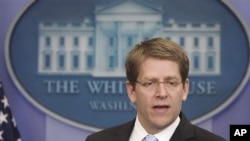The United States is stepping up pressure on the Syrian government to end its violent response to protesters. The White House for the first time said Monday that targeted sanctions are among a range of options the president is considering.
During the past month, the White House has issued five statements about violence in Syria, either directly from President Barack Obama or through his press secretary or the National Security Council, or NSC.
The latest came on Monday in an email from NSC Spokesman Tommy Vietor. He called the violence by the Syrian government against its people "completely deplorable" and said the United States is pursuing a range of possible policy options.
Vietor said steps might include targeted sanctions to "make clear that this behavior is unacceptable." He added that "the Syrian people’s call for freedom of expression, association, peaceful assembly, and the ability to freely choose their leaders must be heard."
At a White House news briefing, Press Secretary Jay Carney referred to President Obama's statement last Friday in which he demanded that "outrageous" violence by Syria's government against protesters come to an end.
In last week's statement, Mr. Obama called on Syrian President Bashar al-Assad to "heed the calls of his own people," but he did not say the Syrian leader should step down. He accused Mr. Assad of "blaming outsiders while seeking Iranian assistance" in repressing Syria's citizens.
On possible new sanctions, Press Secretary Carney declined to give specifics, noting that the United States has had what, he called, a "fairly aggressive" regime of sanctions in place against Syria. U.S. sanctions are being applied under the Syria Accountability and Lebanese Sovereignty Act of 2004. Syria is also on the U.S. list of "state sponsors of terrorism."
Initial U.S. and international steps on Libya included financial sanctions targeting Libyan leader Moammar Gadhafi and officials around him. Carney had this response when asked whether additional sanctions against Syria might mirror those imposed on Libya:
"We are certainly looking at different ways to make clear to the Syrian government how appalling we find this behavior to be, and to encourage them - both as we have in speaking out against it, but in other means - to stop the violence and to move towards serious reform," he said.
Despite the strong condemnation of Syrian government actions last week, President Obama has not suggested that President Assad has lost the confidence of his people, as Mr. Obama did in the case of Libyan leader Moammar Gadhafi.
Mr. Obama's spokesman told reporters on Monday it is up to the Syrian people to decide who their leader should be. Jay Carney also repeated the response the Obama administration has given in each situation of Mideast and North African unrest, that "each country is different."
Carney avoided a direct answer to a question about consultations the United States is having with European countries regarding Syrian sanctions. What the United States can do now, he said, is express its views very clearly, and review possible unilateral actions it can take to respond to the situation.
Related video report by Chris Simkins:





